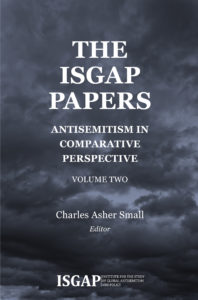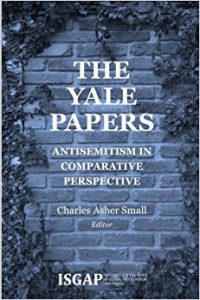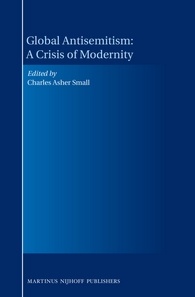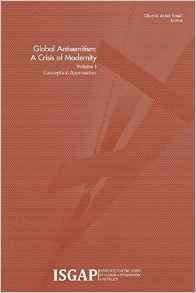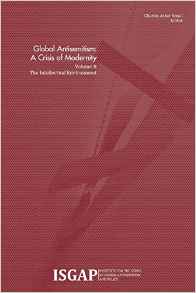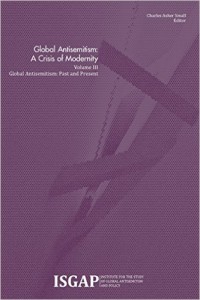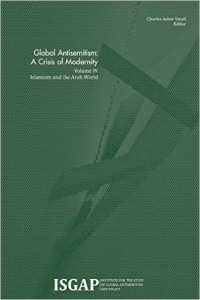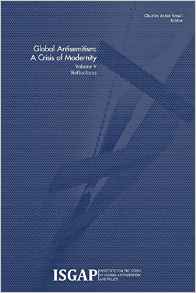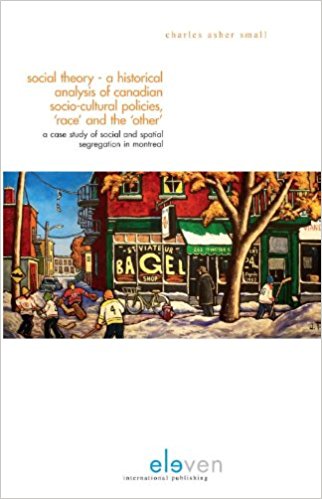The ISGAP Papers: Antisemitism In Comparative Perspective (Volume Three, 2018)
The “Antisemitism in Comparative Perspective” seminar series continues to generate a steady flow of high-quality presentations and papers on a wide range of topics relating to antisemitism. Between 2015 and 2017, ISGAP hosted seminars at numerous academic institutions, including Harvard University, McGill University, Stanford University, Columbia University Law School, the University of Miami, Sapienza University (Rome), Sorbonne University (Paris), the National University of Kyiv, and the American College of Greece (Athens). The present volume – a worthy follow-up to The ISGAP Papers: Antisemitism in Comparative Perspective, Volume Two (2016) – contains a selection of papers presented during this period. Like the seminars on which they are based, these papers cover topics that have profound implications for our understanding of contemporary antisemitism, its impact on Jews and non-Jews, and our efforts to combat this irrational yet enduring prejudice.
It is the hope of all those connected with ISGAP that the papers in this volume will stimulate and inspire readers, help them understand the changing realities of contemporary antisemitism, and encourage them to develop policies and strategies to combat and defeat this and other destructive hatreds. With the publication of this latest volume, as well as all its other academic efforts, ISGAP continues to fight antisemitism on the battlefield of ideas.
The ISGAP Papers: Antisemitism In Comparative Perspective (Volume Two, 2016)
The “Antisemitism in Comparative Perspective” seminar series of the Institute for the Study of Global Antisemitism and Policy (ISGAP) continues to generate a steady flow of high-quality presentations and papers on a wide range of topics relating to antisemitism. Between 2012 and 2014, ISGAP hosted seminars at Harvard University, McGill University, Columbia University Law School, Fordham University’s Lincoln Center Campus in New York, the Hoover Institution at Stanford University, the University of Miami, Sapienza University (Rome), and other academic institutions. The present volume―a worthy follow-up to The Yale Papers: Antisemitism in Comparative Perspective (2015)―contains a selection of papers presented during this period. Like the seminars on which they are based, these papers cover topics that have profound implications for understanding contemporary antisemitism, its impact on Jews and non-Jews, and efforts to combat this enduring form of hatred.
The Yale Papers: Antisemitism in Comparative Perspective (Volume One, 2015)
Between 2006 and 2011, the Institute for the Study of Global Antisemitism and Policy (ISGAP) established and sponsored the Yale Initiative for the Interdisciplinary Study of Antisemitism (YIISA), the first academic research center dedicated to the study of antisemitism based at a North American university. During its mandate, YIISA hosted a successful graduate and post-graduate fellowship program, research projects, and a high-level interdisciplinary seminar series at Yale University. The Yale Papers: Antisemitism in Comparative Perspective includes a selection of the papers presented in the framework of this seminar series, as well as several other working papers, conference papers, and lectures commissioned by or submitted to YIISA by eminent scholars and researchers from around the world. In addition to providing a scholarly analysis of the many facets of historical and contemporary antisemitism around the world, this volume stands as a solid and incontrovertible testament to the abundant – and, above all, productive – academic activity that characterized YIISA’s truncated tenure at Yale University.
Global Antisemitism: A Crisis of Modernity (2013)
Edited by Charles Asher Small
Executive Director of the Institute for the Study of Global Antisemitism and Policy (ISGAP)
These volumes present a selection of the papers presented at the “Global Antisemitism: A Crisis of Modernity” conference organized by YIISA/ISGAP at Yale University in August 2010.
Volume I includes papers that approach antisemitism from a wide range of conceptual perspectives and scholarly disciplines. Volume II deals with matters of antisemitism and the intellectual environment. The papers in this volume focus on the treatment of Israel in the media and the study of antisemitism in the academy. Volume III examines the manifestations and impacts of antisemitism in various regional contexts. Some of the papers focus on historical cases, while others focus on recent or contemporary matters. Volume IV on Islamism and the Arab world examines a form of antisemitism that has become especially virulent in recent times. It is also a form of antisemitism whose origins and manifestations are perhaps less well-known to academics and policy-makers due to the supposedly controversial nature of this topic. This volume includes papers from some of the leading experts in this area. Volume V comprises various “reflections” that were presented at the conference by a number of well-respected observers, academics, and practitioners. They provide insightful observations and important analysis but are not presented in the form of classic academic papers.
Introduction
Click on the links below to read the volume’s complete introduction.
Social Theory – A Historical Analysis of Canadian Socio-Cultural Policies, ‘Race’ and the ‘Other’: A Case Study of Social and Spatial Segregation in Montreal (2013)
Canadian society differs from the US – in particular, a central theme is the problem of reconciling Quebec nationalist aspirations within the economic union of Canada and its English speaking majority. While the U.S solution to ‘ethnic’ diversity has officially been the ‘melting pot’ model, the Canadian approach has formally been the recognition of diversity and group rights within the contemporary policy of ‘multiculturalism.’ The policy emerged from a national debate that attempted to conciliate the French Quebec population, but it resulted in the eventual recognition of the ‘Other’ groups. This book examines the Canadian socio-cultural policies of immigration and ‘multiculturalism, ‘ and the impact on socio-economic and spatial differentiation in Canadian society, with Montreal as the case study. The main objectives are to illustrate levels of stratification within Canadian society and to analyze this within a historical and material framework. The book ultimately examines the state of contemporary ‘race relations’ in the city, offering a critical theoretical framework and assessing various conceptual schools of thought pertaining to issues of social and spatial segregation. It also looks at conceptual questions, such as the construction of ‘race’ and ‘ethnicity’ and the role of the state in implementing social policies.
Anti-Israel Sentiment Predicts Anti-Semitism in Europe
Charles A. Small and Edward H. Kaplan, Journal of Conflict Resolution, (Vol. 50 No. 4), August 2006.
In the discourse surrounding the Israeli-Palestinian conflict, extreme criticisms of Israel (e.g., Israel is an apartheid state, the Israel Defense Forces deliberately target Palestinian civilians), coupled with extreme policy proposals (e.g., boycott of Israeli academics and institutions, divest from companies doing business with Israel), have sparked counterclaims that such criticisms are antisemitic (for only Israel is singled out). The research in this article shines a different, statistical light on this question: based on a survey of 500 citizens in each of 10 European countries, the authors ask whether those individuals with extreme anti-Israel views are more likely to be antisemitic. Even after controlling for numerous potentially confounding factors, they find that anti-Israel sentiment consistently predicts the probability that an individual is antisemitic, with the likelihood of measured antisemitism increasing with the extent of anti-Israel sentiment observed.
Globalization and Marginalization: Essays in the Paradoxes of Global and Local Forces
Edited by Charles Small, Olufemi Vaughan & Marcheta Wright. Ibadan : Sefer, 2005.

